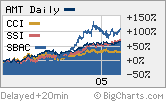 |
| Shares of wireless tower companies have surged despite concerns about cell phone carrier consolidation. |
|
|
|
| * EV (Enterprise value) is market value plus debt and preferred stock | | Sources: Thomson/Baseline, Thomson/First Call |
|
|
|
|
NEW YORK (CNN/Money) – Investors often can profit handsomely from a misunderstanding on Wall Street.
Take what happened at the beginning of last year to four stocks: American Tower (Research), Crown Castle International (Research), SpectraSite (Research) and SBA Communications (Research).
Shares of these companies, which lease space on towers to major cell phone companies for antennas and other network equipment, took a nosedive in early 2004 after Cingular announced it was buying AT&T Wireless.
The thought was that more consolidation of wireless companies would be on the way and that merged carriers would cut back on cell sites. In addition, investors feared that fewer, larger carriers could strong-arm tower companies for lower lease rates.
But after the initial sense of panic, the four tower stocks have gone on to rally an average of 70 percent despite several more deals, including Sprint (Research) buying Nextel (Research) and Alltel (Research) purchasing Western Wireless (Research).
Can you hear me now?
How hot is the sector? A fifth wireless tower company, Global Signal (Research), went public in June and shares have soared 60 percent from their offering price.
Analysts think the best may still be yet to come for the group.
That's because the major carriers will probably have to lease even more tower space to remain competitive. After all, the carriers are increasingly stressing service, not low monthly rates, in their commercials.
"There will be an additional need for more tower space in the next three years as wireless data services ramp up. Data travels shorter distances than voice so companies will need to add more sites to ensure the quality of their networks," said James Lee, an analyst with Decision Economics Investment Research.
Cingular announced in January that it planned to spend between $6.8 billion and $7.2 billion on capital expenditures in 2005, up from about $6 billion (including AT&T Wireless) last year. So much for that deal leading to spending cuts.
And the Sprint-Nextel merger probably won't have much of a negative impact on the industry either, according to Clayton Moran, an analyst with Stanford Group, since Sprint and Nextel don't operate on the same wireless platforms.
"With two different technologies, Sprint and Nextel will need to operate both networks for the next several years," said Moran.
Transmitting good growth signals
So the tower operators won't get squeezed any time soon. In fact, Robert Gensler, manager of the T. Rowe Price Media and Telecommunications fund, said that the tower companies should be able to keep raising rental rates by a small amount for the foreseeable future.
Gensler said that because these companies don't see expenses rise that much annually, revenue growth translates quickly into healthy gains in earnings before interest, taxes, depreciation and amortization (EBITDA).
Due to relatively high debt loads and huge upfront costs to build towers, analysts tend to look at EBITDA since most of the companies are not expected to make money on a net income basis.
"The neat thing about these companies is that costs only go up about 2 to 3 percent a year, mainly from real estate taxes. So with single digit top line growth, you all of a sudden have EBITDA growth in the low teens. This is durable, predictable growth," said Gensler, whose fund owns shares of American Tower, Crown Castle and SpectraSite.
All five companies are expected to generate healthy gains in EBITDA this year but valuations remain attractive. Lee said the companies he follows trade at EBITDA multiples in the mid to high teens, reasonable prices to pay for companies growing at about 10 to 15 percent.
Lee adds that the companies have the potential for growth in new markets as well, such as installing wireless antenna systems in public places with poor reception, like shopping centers. SpectraSite has emerged as a leader in this segment, he said, with networks already in place in 70 malls and 15 casinos.
And Moran said that the tower companies also have a chance to boost their cash flows this year by refinancing their debt loads since interest rates are still relatively low. He thinks SBA Communications has the most to gain from lightening their interest expenses.
All in all though, the tower operators appear to provide something that's rare in the rapidly changing telecom world: stability.
"The tower companies are good sleep well investments. It's tougher and tougher to find good growth in telecom so this is a great way to play the sector," said Gensler.
For a look at how telecom stocks are faring, click here.
Analysts quoted in this story do not personally own shares of the companies mentioned and their firms have no investment banking ties to the companies.
Sign up to receive the Tech Investor column by e-mail.
Plus, see more tech commentary and get the latest tech news.

|